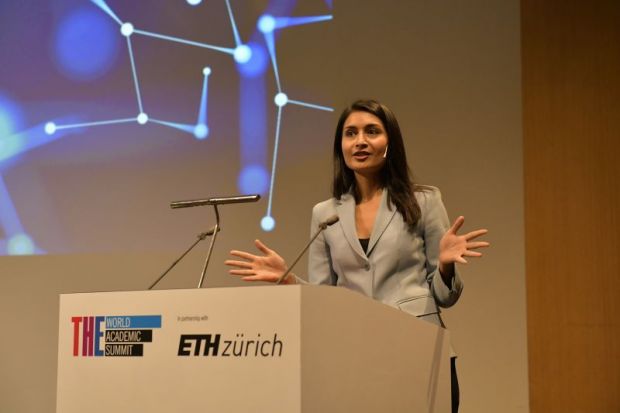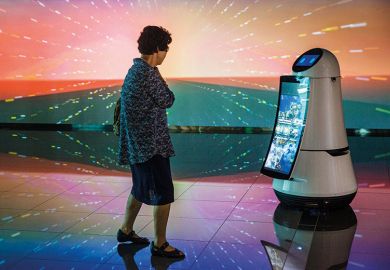Universities will be more crucial than ever in ensuring the stability of democracies by providing skills that prevent millions of people being disenfranchised by automation, a leading economist has predicted.
In the opening keynote of Times Higher Education’s World Academic Summit at ETH Zurich, Saadia Zahidi, managing director of the World Economic Forum’s Centre for the New Economy and Society, said that modelling by her organisation, done in conjunction with some of the world’s largest corporations, indicated a massive shift towards the automation of certain jobs over the next decade.
While some 29 per cent of all tasks in the workplace were completed by machines in 2018, this proportion would rise to 52 per cent by 2025, said Ms Zahidi, a Pakistan-born economist known for her 2018 book Fifty Million Rising, which describes the impact of Muslim women entering the workplace across the world.
Working in partnership with industry, universities would be crucial in ensuring that as many people as possible are able to upskill, retrain or learn relevant skills in the digital age, when millions of skilled jobs will be replaced by robots or automated processes, said Ms Zahidi.
That would be crucial not only for the economic prosperity of developed nations, but also for their political stability, which could be severely disrupted if middle-class workers are supplanted by emerging technologies, just as lower-skilled employees have been already, she said.
“If we do not want a complete hollowing-out of the middle class – if we want to restore this path to socio-economic mobility that universities were supposed to provide – there has to be a collective responsibility to bridge that [skills] gap,” said Ms Zahidi.
“Otherwise, we are looking at a much more polarised, much more unequal society than before.”
Ms Zahidi’s comments echoed those made by ETH Zurich’s president Joël Mesot, who warned about the dangers of focusing solely on finding and developing “super talents” within knowledge economies.
While ETH – and Switzerland more generally – had historically relied on the “availability and motivation of intelligent and entrepreneurial minds” for its prosperity, Professor Mesot acknowledged that this concentration on the brightest and best talent had risks.
“As one of the world’s oldest democracies, we are aware that the one-sided promotion of super talents is not a sustainable model for social and economic stability,” he said. “For if the gap widens between the highly educated and those lacking opportunities, social cohesion is at risk.”
Register to continue
Why register?
- Registration is free and only takes a moment
- Once registered, you can read 3 articles a month
- Sign up for our newsletter
Subscribe
Or subscribe for unlimited access to:
- Unlimited access to news, views, insights & reviews
- Digital editions
- Digital access to THE’s university and college rankings analysis
Already registered or a current subscriber? Login








